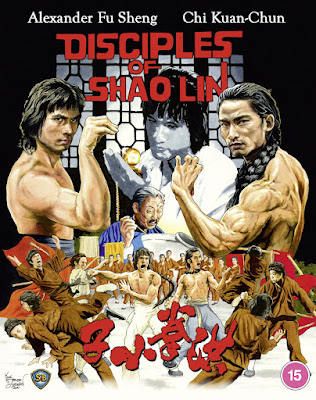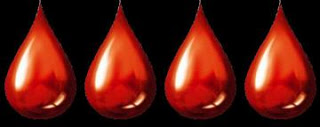Director: Chang Cheh
Notable Cast: Alexander Fu Sheng, Chi Kuan-Chun, Chen
Ming-Li, Wang Ching-Ping, Lu Ti, Chiang Tao, Fung Hak-On
There are an epic amount of kung fu movies that start off
with a demonstration of the martial arts that will be shown in the upcoming
film, performed in front of a starkly colored backdrop. It’s a commonplace
occurrence in many of these films, particularly from a specific time period,
that fans of the studio’s output will be familiar with.
With Disciples of Shaolin, there is a specific tone
to how the film starts in this style. The bright yellow background allows a
shirtless Alexander Fu Sheng to pop, as he runs through a series of kung fu
movements. There is no score. The sound of the metal rings on his arms clank
and jingle. His face is dour and intense. He moves to practice on a set of Shaolin
poles as a soundtrack finally sneaks in for the last portion.
This routine carries on for almost five minutes before the
film leaps into its main story, following a bullheaded and cocky young fighter,
played by Alexander Fu Sheng, as he attempts to make a name for himself on the
hard streets while befriending another mysterious fighter played by Chi
Kuan-Chun.
There is an intensity and seriousness to this opening
sequence that feeds into the tonality of writing and direction that makes Disciples
of Shaolin one of the best of director Chang Cheh’s ‘Shaolin era’ for the
Shaw Brothers studio. Like many of the other films in this loosely thematic
series, this 1975 kung fu classic has a lot to say about its characters and it
does so in such an effective way that its writing and dramatic punches often outweigh
its more entertaining elements. That’s a hell of a statement when referring to
a kung fu film of this caliber.
The core of what Disciples of Shaolin is saying
thematically stems back to many of the classic character and narrative tropes
that Chang Cheh loved to utilize. Brotherhood, social justice, revenge, and
tragedy for those involved in any of those themes all lift the plot up. When
our hero, played by Alexander Fu Sheng while delivering one of the best
performances of his unfortunately short career, is faced with a system that
continually exploits him, he will eventually have to fight back against the
shackles to free himself. Whether its character choices in his obsession with
his shoes as a social status or the repeated use of watches and clocks to
indicate a ticking time until his world collapses, Disciples of Shaolin
embeds solid character work with a tragic and dramatic story that works in
spades.
To say that this film solidifies Fu Sheng as a powerhouse actor might be an understatement. His performance is lovable and mischievous, dedicated and comedic at times and his presence is the reason that any of the themes and action sequences work. His increasing cockiness as his status grows in the town may be a trope of the hero’s journey, but director Chang Cheh guides the tonality and performance by Fu Sheng in a manner that feels dynamic and connective with the audience.
While the film is strangely titled Disciples of Shaolin
when there is only assumed Shaolin aspects to it - including the overall
mystery to where Fu Sheng and Chi Kuan-Chun learned their impressive kung fu
skills, the action is impressively choreographed and executed. As expected with
most Shaw Brothers flicks. Although the latter actor, Chi Kuan-Chun, only gets
one true fight at the very end of the film and it’s hardly the best of the film,
Fu Sheng gets to show off his abilities here with relative ease. Mostly working
in a one-on-two-dozen series of fights. Fu Sheng and Chang Cheh tack in a bit
of comedy, not as a tone setter but as a character trait, and the balance
between sheer ass-kicking and the character/plot driving mechanics works with
the force of rapid fire punches from the iconic hero.
Disciples of Shaolin is not the flashiest of the Shaw
Brothers films and not even the most spectacle-driven of Chang Cheh’s Shaolin
era, but this film has such a strong sense of character, narrative, and
thematic layering that it might be one of the best. Remade later on by the Shaw
Brothers studio with Johnnie To at the helm and Aaron Kwok in the lead as The
Bare-Footed Kid, it’s obvious this film has a strong story-driven
foundation and for martial arts fans it’s a must-see, must love, and must own
film.
Particularly now that it’s been unleashed on a beautiful new
Blu Ray courtesy of our friends over at 88 Films in the US with two
commentaries and a fantastic restoration.




No comments:
Post a Comment